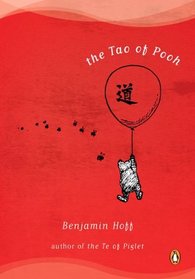Helpful Score: 5
Probably one of my top twenty favorite & most recommended reads ... Beautiful!
Helpful Score: 4
Review copied from Amazon:
This book is based around the idea that A. A. Milne's stories of Winnie-The-Pooh can be used to illustrate the basic notions of Taoism. Hoff is not by any means arguing that Milne was a Taoist. He is merely saying that Milne's inner attitude to life, as revealed by the stories, intuitively follow along the same path as Taoism. Owl is wise, Rabbit is cleaver and Eeore is smugly superior but the real hero of the books is Pooh, the apparently stupid yet strangely successful and able bear.
The book covers the Taoist principles of:
Tao, or the indescribable Way of the universe,
P'u, or natural simplicity, the Uncarved Block,
Inner Nature, being those things that make us exactly who we are,
Wu Wei, or proceeding without doing, causing, or making,
Tzu Jan, or 'self so', meaning that things happen by themselves, spontaneously,
Tz'u, or caring and compassion, and,
T'ai Hsu, or the Great Nothing.
Along the way we learn the pitfalls of being too busy and the benefits of doing nothing (for example meditation and contemplation). Having read this I now try to arrange my day so that I can spend half an hour a day in my garden with my cat just doing nothing but observing nature and thinking the thoughts that come to mind. I recommend it to everyone.
This book is based around the idea that A. A. Milne's stories of Winnie-The-Pooh can be used to illustrate the basic notions of Taoism. Hoff is not by any means arguing that Milne was a Taoist. He is merely saying that Milne's inner attitude to life, as revealed by the stories, intuitively follow along the same path as Taoism. Owl is wise, Rabbit is cleaver and Eeore is smugly superior but the real hero of the books is Pooh, the apparently stupid yet strangely successful and able bear.
The book covers the Taoist principles of:
Tao, or the indescribable Way of the universe,
P'u, or natural simplicity, the Uncarved Block,
Inner Nature, being those things that make us exactly who we are,
Wu Wei, or proceeding without doing, causing, or making,
Tzu Jan, or 'self so', meaning that things happen by themselves, spontaneously,
Tz'u, or caring and compassion, and,
T'ai Hsu, or the Great Nothing.
Along the way we learn the pitfalls of being too busy and the benefits of doing nothing (for example meditation and contemplation). Having read this I now try to arrange my day so that I can spend half an hour a day in my garden with my cat just doing nothing but observing nature and thinking the thoughts that come to mind. I recommend it to everyone.
Helpful Score: 2
This book uses the characters of Pooh to teach in easily understandable language the philosopy of Taoism. It will delight people both new to this philosophy & those who have tried to follow this philosophy in their own life. The characters bring alive practical ways to weave the philosophy into everyday life.
Helpful Score: 2
Quick little read, great for a Sunday afternoon, in which the author explains the principles of Taoism as it relates to our old friend Winnie the Pooh and his friends in the Hundred Acre Wood. A bit silly at times, but all in all enjoyable read with very good examples pulled from the works of A.A. Milne and correlated to Taoist theory/belief.





